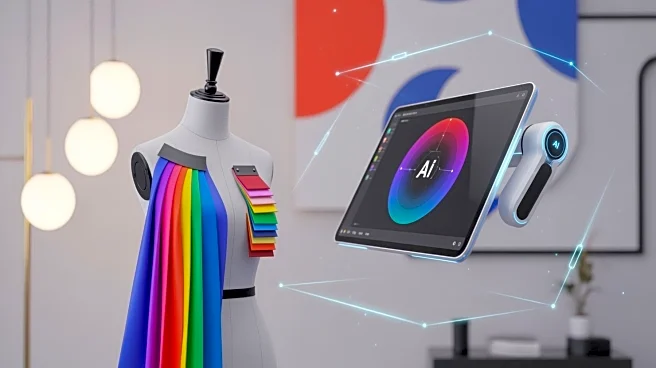What's Happening?
Fashion industry leaders are increasingly engaging with artificial intelligence (AI) to enhance personalization and streamline creative processes. At a recent roundtable hosted by The Business of Fashion, executives from major companies such as Kering,
Ferrari, and Luxottica discussed the integration of AI into their business strategies. The conversation highlighted AI's potential to transform personalization, particularly for luxury brands that emphasize individuality and craftsmanship. While some companies are in the pilot phase of AI adoption, others are already implementing AI-driven personalization on a larger scale. The discussion also addressed the balance between AI's efficiency and the strategic nuance provided by human experience, emphasizing the importance of collaboration between creative and executive teams.
Why It's Important?
The adoption of AI in the fashion industry signifies a shift towards more personalized consumer experiences and efficient workflows. For luxury brands, AI offers the ability to scale bespoke experiences, potentially increasing customer satisfaction and loyalty. However, the integration of AI also raises concerns about the future of work, as automation may threaten certain roles. The industry's approach to AI could set a precedent for other sectors, highlighting the need for strategic alignment and critical thinking in the age of technology. Companies that successfully navigate this transition may gain a competitive edge, while those that fail to adapt could face challenges in maintaining relevance.
What's Next?
As AI continues to reshape the fashion industry, companies are likely to further explore its applications in personalization and creative collaboration. Executives may focus on training emerging leaders to become skilled 'AI editors,' capable of curating and contextualizing AI outputs. The industry may also see increased experimentation with AI-driven personalization, with companies observing early adopters to learn from their successes and missteps. Future discussions may center around the ethical implications of AI and its impact on the workforce, as well as strategies for maintaining the creative essence of fashion while leveraging technological advancements.
Beyond the Headlines
The integration of AI in fashion raises ethical considerations, particularly regarding the balance between automation and human creativity. As AI becomes more prevalent, companies may need to address concerns about data privacy and the potential for AI to perpetuate biases. Additionally, the industry's reliance on AI could lead to long-term shifts in consumer expectations, with personalization becoming a standard rather than a luxury. These developments may influence broader cultural trends, as fashion continues to intersect with technology in new and innovative ways.















